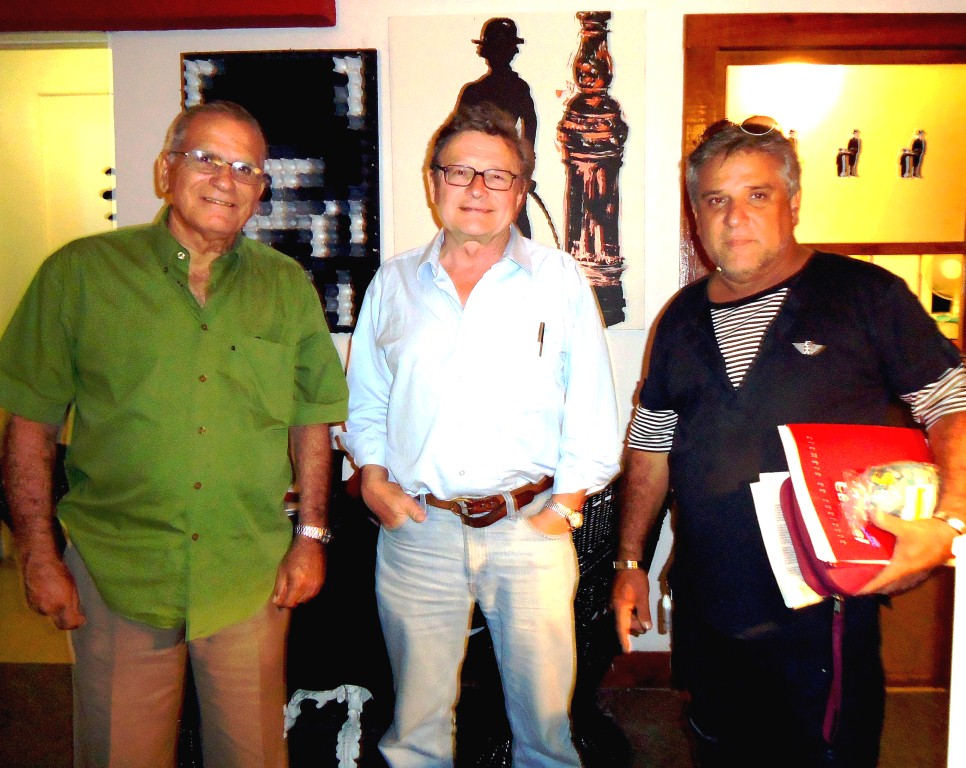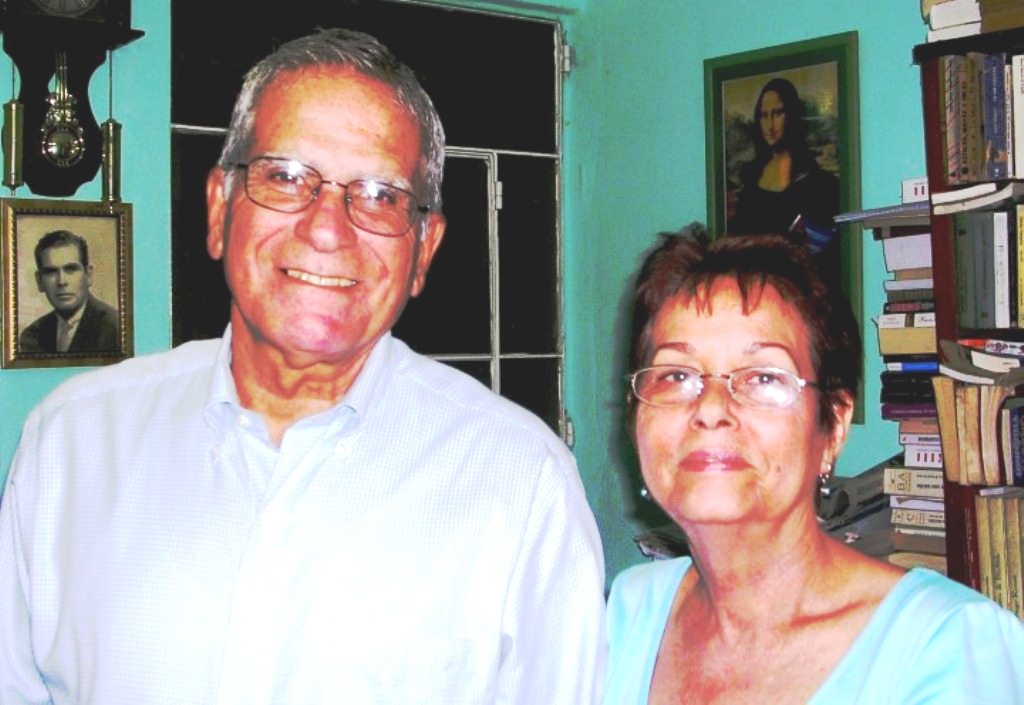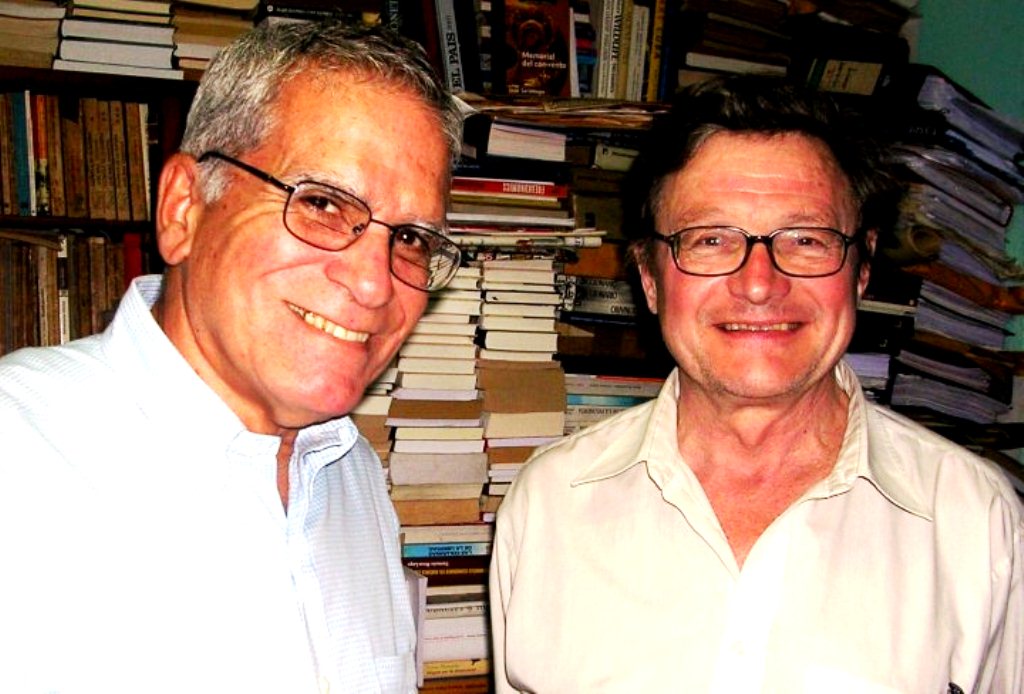Miriam Leiva and The The Cuba Central Team on Oscar Espinosa Chepe
From The Cuba Central Team, original here:http://www.democracyinamericas.org/blog-post/vigil-in-madrid-some-thoughts-about-oscar-and-miriam/
Dear Friends:
“I expect the end to come soon.”
Miriam Leiva wrote these words about her husband, Oscar Espinoza Chepe, whose long struggle against liver disease seems near its end in Hospital Fuenfría near Madrid in Spain. As we read her message, we were reminded why we respect this couple so much.
They just like to tell the truth as they see it.
Their candor made some people in Havana and Miami very uncomfortable. Three years ago, Oscar referred to hardliners in both cities as “The Taliban.” This may explain why Oscar and Miriam are rarely mentioned by the embargo’s biggest supporters in Washington, because their views never fit so neatly into the hardliner’s black-and-white definition of what constitutes “dissent.”
Oscar Espinosa Chepe, an economist and independent journalist, fell from grace in Cuba more than once. In the 1960s, after serving as an economist for Fidel Castro, he was sent to work in the fields after he expressed negative views about the economic situation in his country.
In the 1980s, Oscar, back in favor and working as an economic counselor, served for three years in Eastern Europe with Miriam, then a member of Cuba’s foreign service, just as perestroika was beginning to take hold. But, upon their return to Cuba for a vacation, they were told they could not go back to Europe. Instead, Oscar was assigned to work at the National Central Bank of Cuba.
In 1992, they were called to a meeting where Oscar was called out as “counter-revolutionary.” For the next twenty years, he and Miriam were devoted activists, though, as Oscar said, “We expressed our views in a pacific way.”
Oscar was arrested with 74 others in Cuba’s March 2003 crackdown. Sentenced to twenty years, Oscar left prison after twenty months, released on a temporary medical parole; at any time, authorities could have ruled he was no longer sick and returned him to custody.
Nevertheless, upon leaving custody, Oscar resumed speaking his mind. While he praised President Raúl Castro’s economic reforms as sensible and rational if incomplete, he was sharply critical of officials inside the system who were obstacles to change, and criticized those who saw private property as incompatible with social justice.
He chastised the government for failing to reciprocate President Obama’s “gestures,” the reforms on family and people-to-people travel. He expressed his bewilderment at the imprisonment at Alan Gross and thought he should be set free.
This record of speaking out could have endeared Oscar to sanctions supporters in Miami except for his unshirted contempt for those he called “Hardliners for Castro.” He believed their support of sanctions kept Cubans hostage to their dreams of returning to power in a Cuba that last existed during Batista’s reign in the 1950s. He resented their attacks on Cuba’s Catholic Church, which was instrumental in freeing the remaining prisoners arrested in 2003, along with many others.
In his statement opposing travel restrictions offered by Rep. Mario Díaz-Balart, Oscar said: “If the policies proposed for Cuba by the hardliners had been maintained for Eastern Europe and China, we would possibly still have a Berlin Wall and the heirs of the Gang of Four would still govern China.”
Oscar and Miriam, in their work together, were motivated by a spirit of reconciliation that included everyone; even those who took no personal risks, but sat in air conditioned offices far from Cuba and questioned their credibility as political activists. Instead, they chose to believe that all Cubans could work together, that families could reunite, and that “all animosity prevailing in our country since March 10, 1952 can be overcome.”
Earlier this year, a medical crisis led them to depart Cuba for Spain, so Oscar could receive what Miriam then called “urgent” medical attention for his chronic liver failure.
Another truth Oscar never left unspoken was his love for Miriam, especially when he recalled the vigils she organized with other spouses and family members of the 75 detainees. He once said of her: “She is modest. She is brave, especially as demonstrated by her actions while I was in prison.” Whether he was in Guantanamo or Santiago de Cuba, “she was there.”
Now, on another vigil, Miriam is there for Oscar again. By posting updates on Facebook and a blog, Reconciliación Cubana, she has made it possible for us to accompany her on this sad, respectful, journey that she hopes will end soon.
Muy Grave Oscar Espinosa Chepe en Madrid
Oscar Espinosa Chepe, economista y periodista independiente, prisionero de conciencia de los 75, condenado a 20 años de cárcel durante la Primavera Negra de 2003, con licencia extrapenal ¨hasta que recupere su salud¨,
Chepe llegó a Madrid el 12 de marzo para recibir asistencia médica a su grave dolencia crónica del hígado, exacerbada durante la permanencia en el Cuartel General de la Seguridad del Estado ¨Villa Marista¨, la Prisión Provincial de Guantánamo, Boniatico en la Prisión de Boniato en Santiago de Cuba y la cárcel de máxima seguridad Combinado del Este en La Habana, con estancias en los hospitales de esas provincias por difíciles gestiones de la familia e internacionales.
Su firme propósito era regresar a Cuba tan pronto como mejorara su precario estado físico, para el cual no había mayores tratamientos médicos en Cuba, que los proporcionados durante varios ingresos en el Hospital Manuel Fajardo y en el Centro de Cirugía de Mínimo Acceso en La Habana. Con ese fin, el gobierno de España ha propiciado la atención médica en el Hospital Puerta de Hierro de Majadahonda, con la asistencia del Cardenal Jaime Ortega, a los cuales agradece su apoyo, así como a la Comunidad de Madrid, los médicos y personal sanitario, amigos españoles, de otras nacionalidades y cubanos.
Sin embargo, la especializada atención en el moderno Hospital Puerta de Hierro no ha podido revertir el curso de la enfermedad, por lo que en estos momentos Chepe se encuentra en muy grave estado, con su esposa en Madrid. Lamentablemente, Oscar no ha recorrido la acogedora y bella ciudad, pues la enfermedad mermó sus fuerzas físicas progresivamente y ha permanecido ingresado en el hospital o acostado en la habitación del lugar de residencia. Su cuerpo se apaga con grandes molestias, mientras sus ideas y pensamientos continúan dedicados a Cuba y su pueblo. Espero un desenlace fatal pronto.
Miriam Leiva, Esposa de Oscar Espinosa Chepe,
Activista de Derechos Humanos y Periodista Independiente,
Madrid, 21 de agosto de 2013
 Oscar Espinosa Chepe, Arch Ritter and Roberto Robaina, April 2012
Oscar Espinosa Chepe, Arch Ritter and Roberto Robaina, April 2012
 Oscar Espinosa Chepe and Miriam Leiva, 2012. Photo by Arch Ritter
Oscar Espinosa Chepe and Miriam Leiva, 2012. Photo by Arch Ritter


